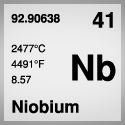
TOLERANT TO SMALL AMOUNTS OF FLUORIDE ION. STRENGTH AT ELEVATED TEMPERATURES, WITH RESISTANCE TO CORROSION AND LIQUID METALS.
Niobium, as with other reactive metals, owes its corrosion resistance to a passive, tenaciously adherent oxide film. The corrosion properties of niobium are similar to those of its sister element tantalum, however, it is less resistant to more aggressive media. Unlike the other reactive metals, niobium will tolerate the presence of small amounts of fluoride ion. Niobium and its sister tantalum can become embrittled with hydrogen in alkaline service, however, it is one of the few materials that are resistant to aqua regia. The oxidation rate of niobium in air increases with temperature and becomes quite rapid above 500°C. Therefore, when niobium is used at higher temperatures, coatings must be employed to minimize detrimental oxidation. Applications include missiles and aerospace because of strength at elevated temperatures and the chemical industry due to corrosion resistance. It is also resistant to many liquid metals.
PROPERTIES
Niobium is a sister element to tantalum. It is a shiny white metal and is very ductile. It takes on a bluish cast after long exposure to air.
- Atomic No. 41
- Atomic Wt. 92.9064
- Specific Gravity 8.57
- Melting Point 2477˚C
- Coefficient of Thermal Expansion 6.9 X 10-6/°K
- Specific Heat 0.063 cal/g/°K
- Ultimate Tensile Strength (Room Temperature, Annealed) 30 ksi
- Yield Tensile Strength (Room Temperature, Annealed) 15 ksi
- Poisons Ratio 0.38
- Modulus of Elasticity 15 X 106 psi
- Recrystalization Temperature 800˚C–1200˚C
GENERAL CORROSION RESISTANCE
Niobium is less resistant to aggressive media than its sister element tantalum. However, it will tolerate aqua regia and small amounts of fluoride ion in acidic solutions. It is especially resistant under oxidizing conditions. Niobium is resistant to many molten metals; lithium and sodium-potassium alloy
This data is based on laboratory testing only. Your in-plant results may differ. Testing is recommended under other conditions as needed.
